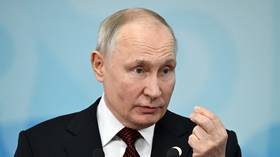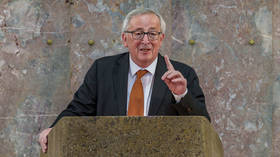Putin explains why Ukraine rejected 2013 EU deal

The EU-Ukraine Association Agreement essentially envisaged the death of all Ukrainian industry, Russian President Vladimir Putin has claimed. The ratification of the accord was put on hold in late 2013 by then-President Viktor Yanukovich, which sparked the Maidan coup that led to his overthrow.
The new Ukrainian government signed the agreement in 2014.
Speaking to reporters on Friday, Putin said: “If you read what the EU proposed to Ukraine, this is what is apparently being realized now – this was tantamount to the destruction of all key industries that the Soviet Ukraine once prided itself on.” The president added that “we now see exactly that there’s nothing left there already.”
According to Putin, Yanukovich was weighing Kiev’s options and simply postponed the ratification of the agreement with the EU in 2013.
In an interview with Politico late last month, Ukrainian Prime Minister Denis Shmigal said Kiev expects full EU membership within two years, and will not settle for anything less. He cited the “huge price” his country has paid to join the bloc.
Shmigal went on to pledge that Ukraine will “not be bringing problems” to the EU, but will be a helpful addition.
Speaking at a press conference following a summit of EU leaders in the Spanish city of Granada last week, European Commission President Ursula von der Leyen said the process of accession for any aspiring nation should be strictly “merit-based,” with certain “milestones that have to be achieved” first.
The joint declaration adopted by the member states calls on Ukraine and other hopefuls to “step up their reform efforts, notably in the area of rule of law.”
European Council President Charles Michel said the EU should be ready to expand by 2030.
However, this timeframe apparently did not sit well with all member states. Dutch Prime Minister Mark Rutte insisted that “it’s not a question of when countries are ready; it’s a question of whether countries are ready.”
Joining the EU has been among the key stated objectives of pro-West Ukrainian politicians for decades. Kiev had not achieved much progress on this path prior to February 2022, when Moscow launched its military operation in the country. The conflict appears to have re-invigorated the process, with top officials repeatedly demanding membership due to Ukraine’s perceived role in defending the EU from an allegedly looming Russian invasion.













